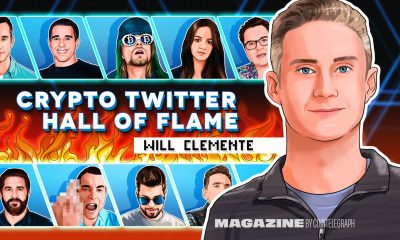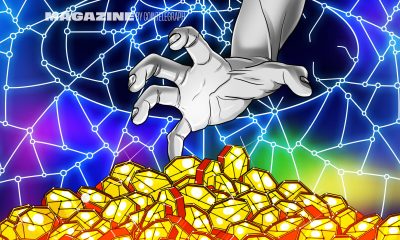scams
Journeys in Blockchain: 3LAU, DJ and Producer

“The Treasury can just snap their fingers and print money. Bitcoin doesn’t work that way. Here’s this alternative financial system that I’ve never really thought about before. All of a sudden I was like, huh, there’s something here.”
Loving what you do, doing what you love
While music was always Blau’s greatest passion, he still felt a need to pursue business as a career path. He always knew, he says, that he’d be involved in traditional things like finance, “just maybe not in a nine to five capacity”.
Studying finance at Washington University in St. Louis, Blau began playing DJ gigs on weekends. He started making enough money to cover any salary he would have earned out of college, but his grades were suffering.
During his junior year he traveled every weekend to perform, returning to school only to get mediocre marks. He questioned the purpose of staying in college. “Why finish school if I’m not going to get great grades?”
“That was the turning point. I was making enough money and I had to make a choice. I couldn’t pursue both. I couldn’t be a great student and a great DJ at the same time.”
“It was a difficult choice,” Blau says. “At the time, my goal was just to do what I love, and make enough money to survive doing it.”
“Playing in front of a crowd, playing a song that I spent six months to a year working on, it’s the best feeling in the world. If I could do that and make money, then wow, I’m gonna do that. It was a no-brainer…”
His parents weren’t happy with the decision initially, but his teachers were supportive. “I was lucky to be at school on a full-merit scholarship, so my parents really couldn’t tell me ‘no’ because they weren’t paying for college.” His economics professor assured his parents that he could keep his scholarship for seven years if he took a leave of absence.
Blau’s professor convinced the parents to back the decision, telling them that the opportunity cost was not extremely high, that he’d never know if he had a shot if he didn’t give it a shot. And that if it didn’t work in two years, they could send him back to school.
“And I never went back.”
Blau is thankful for his parents’ support “after the initial insane decision that I made to leave school and pursue this full-time”.
He says he has maintained an involvement in finance, whether that’s in real estate, equities or derivatives. “I’ve always maintained a closeness to the financial world in some way, shape or form.”
Three years ago, Blau started his own scholarship at the school to support a student who has both creative and academic ambitions. “I didn’t finish in school. They gave me a merit scholarship, so now we’re hopefully paying it forward to another student who can accomplish both.”
Introduction to Bitcoin
At a DJ gig in Mexico Blau was introduced to Tyler and Cameron Winklevoss, the cryptocurrency pioneers who founded the Gemini exchange. They became friends and Blau stayed with the brothers in Los Angeles during Grammy week. At the time, they were focused on building out Gemini and while he admits he knew nothing about blockchain tech, conversations with the twins piqued his interest.
“It was so revolutionary, right?”
Blau explains that after reading the Bitcoin whitepaper and diving deeper, he discovered things he never would have questioned about money, including the problems associated with fiat currency. “Hundreds and thousands of years ago, people would trade gold coins for cattle and there were real intrinsically valuable assets moving between parties. Think of the intrinsic value of the dollar… It’s just this kind of pretend value, at least since they took the dollar off the gold standard.”
The limited supply economics and immutable history of blockchain technology fascinated him. “The Treasury can just snap their fingers and print money. Bitcoin doesn’t work that way. Here’s this alternative financial system that I’ve never really thought about before. All of a sudden I was like, huh, there’s something here.”
He expresses frustration at the fact that it’s impossible to send money directly to someone across the world without depending on intermediaries and becoming vulnerable to counterparty risks. “It doesn’t seem right.”
“This is so clearly the future in some way shape or form. I don’t know how it’s going to manifest, but when you think of transferring value this way, it’s so much more efficient than thinking about a dollar or another foreign currency.”
Tokenization: Our Music Festival
In early 2017, Blau noticed a bevy of Initial Coin Offerings “popping up,” and saw how much money they were raising. “This is crazy. There are all these music projects worth sixty million dollars but I don’t know who any of these people on these teams are. Why don’t we start something?”
He soon began conceptualizing a team project called Our Music Festival, or OMF. “That’s when I started to dive deeper. While I’m not a programmer or a coder or software engineer, I’m a sound engineer, so I was always fascinated by the technological component of currency… The whole token world became fascinating to me.”
Blau began thinking about how to use tokens to reward micro-transfers of value, something that would be impossible with traditional financial systems. “Like, if a fan tells their friends about a show I’m performing at, how can I compensate them for that? How can I incentivize them to tell their friends about a show I’m performing at?”
“How about a smart contract that automatically says if you connect your social accounts to this show, and share the show with friends, I’ll give you five cents, or fifty cents, or whoever refers the most friends gets a backstage pass? That really got me excited.”
Seeing the potential in smart contracts, Blau started thinking about what the music industry might look like in the future. The technology could improve business with the streamlining of royalties, money wiring, and complex accounting processes.
In 2018, Blau decided to work with friends in the music business to launch OMF. “It would be so cool if fans could select a lineup for a music festival and have ownership,” he says.
While the system would need a centralized entity for logistics, fans could pick the lineup and even enjoy profit-sharing. “This was before the whole security token issue existed. No one was even questioning that. Everything was a utility back in late 2017, early 2018.”
With “great lawyers from the music side,” Blau and his team figured out how to create a token-driven music festival. After pitching the project vision to the Stellar and Interstellar engineering teams, a mobile wallet was launched for the festival.
The simple wallet app could be used to scan QR codes and earn token rewards which could then be spent on merchandise at the festival. “It was a great test case to show people just how easy it is to earn and utilize digital currency.”
The San Francisco event promptly sold out.

















